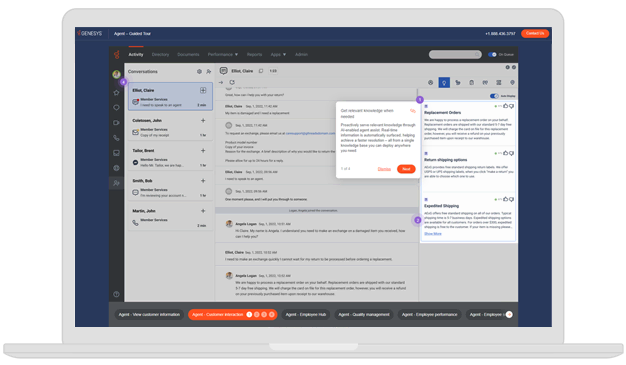Agentic AI is an advanced form of artificial intelligence designed to act with autonomy, reasoning and purpose. Unlike generative AI, which focuses on creating content, agentic AI can analyze context, make decisions and execute actions toward defined goals. It continuously adapts to real-world inputs, improving responsiveness and outcomes across complex business environments.
“True agentic AI represents a shift in how artificial intelligence functions. It moves beyond merely executing tasks and begins to reason, adapt and act autonomously within ethical and operational constraints that the organization defines.”
Glenn Nethercutt
Chief Technology Officer, Genesys
Agentic AI use cases for enterprises
The most common enterprise-level use cases for agentic AI include:
- Transforming customer experience through autonomous decisioning
- Empowering agents with context-aware assistance
- Driving operational efficiency and scalability
- Enhancing predictive and proactive engagement
- Improving governance and accountability in AI operations
1. Transforming customer experience through autonomous decisioning
Traditional AI handles predefined tasks; agentic AI evolves with each interaction. Enterprises use agentic AI to manage dynamic customer journeys — from anticipating needs to resolving issues proactively. This intelligent orchestration enables real-time personalization, turning customer interactions into connected, emotionally intelligent experiences across voice, chat and digital channels.
2. Empowering agents with context-aware assistance
Agentic AI copilots extend beyond scripted automation by reasoning through complex inquiries. They interpret intent, recall past interactions and recommend next best actions, allowing human agents to focus on empathy and judgment. Enterprises gain faster resolutions, consistent service and stronger customer trust through human-AI collaboration.
3. Driving operational efficiency and scalability
With agentic AI, businesses streamline workflows across departments. The technology autonomously prioritizes tasks, routes interactions and adjusts resources based on live data. Enterprises can scale customer engagement globally without increasing headcount — maintaining quality while reducing costs and operational friction.
4. Enhancing predictive and proactive engagement
Agentic AI systems anticipate customer behavior using historical and contextual data. They proactively trigger personalized outreach, such as notifying customers about service disruptions or suggesting renewals. This proactive engagement builds loyalty and strengthens the brand’s reputation for responsiveness and care.
5. Improving governance and accountability in AI operations
Unlike purely generative systems, agentic AI integrates governance frameworks that ensure transparency and compliance. Enterprises can embed ethical guardrails and audit trails, giving teams control over how autonomous decisions are made — critical for industries like finance, healthcare and government.
Accelerate AI innovation with agentic AI in Genesys Cloud
Agentic AI is redefining what’s achievable in customer experience — moving from scripted automation to intelligent orchestration. With Genesys Cloud™ AI Studio and AI Guides, organizations can design, train and deploy agentic AI responsibly — creating experiences that are efficient, empathetic and adaptive at scale.
Discover how Genesys Cloud makes agentic AI practical, powerful and human-centered — helping your business lead in the era of intelligent experience orchestration.







